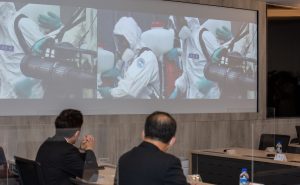Taiwan is undergoing its worst coronavirus outbreak since the pandemic began. It’s been accompanied by an ongoing surge in racism toward Southeast Asians, which the country’s government has largely responded to with silence.
Migrant workers at several Taiwanese factories say they are being denied freedom of movement and subjected to draconian company rules that do not apply to their Taiwanese colleagues. While it’s being done under the auspices of the pandemic, advocates say the double standards are inflaming an existing societal apartheid.
The Guardian reported last week that migrant workers at Taiwan’s ASE semiconductor manufacturer are being forced from their private homes into shared accommodations. Those who do not comply are subject to possible dismissal.
Taiwan is currently under a “level 3” alert, which does not restrict movement and permits some gatherings.
On Saturday, Taiwan’s economic ministry said ASE was following guidelines set by the Central Epidemic Command Center (CECC) – even though CECC guidelines on business operations during a COVID-19 outbreak do not mention migrant worker dormitories.
Officials in Taiwan’s Miaoli county have also instituted a stay-at-home order for migrant workers, which critics have slammed as discriminatory. Under the order, the workers may only travel to and from work in transportation arranged by their employers or labor brokers, and workers are not allowed to do their own shopping for necessities.
Miaoli officials have questioned dozens of migrant workers for allegedly violating the order, which does not apply to Taiwanese nationals.
The rules were put in place after a series of cluster infections within migrant worker dormitories – even though forcing workers into tight living spaces would likely hasten, not slow, the spread of COVID-19.
Taiwanese media has been flooded with similar reports of factories preventing the free movement of foreign employees. The cases are reminiscent of the draconian restrictions set by the Singapore government in 2020 on its migrant worker dormitories, which drew international condemnation and have been devastating to the mental health of workers.
Taiwan has a long history of racist policies governing its Southeast Asian foreign workers, whose lives are largely controlled by employers and third-party labor brokers notorious for exploitative practices that sometimes cross into the realm of forced labor.
The United States, in its State Department’s annual Trafficking in Persons reports, has consistently criticized exploitative practices by labor brokers, who charge exorbitant fees that workers cannot pay, leaving them mired in debt.
Taiwan President Tsai Ing-wen recently welcomed a United States delegation to the island and has touted an incoming donation of U.S. vaccines.
However, she has made no public statements about the discrimination toward foreign factory workers, nor has her government responded to advocates calling for migrant workers in crowded dormitories to be prioritized for vaccinations.

































